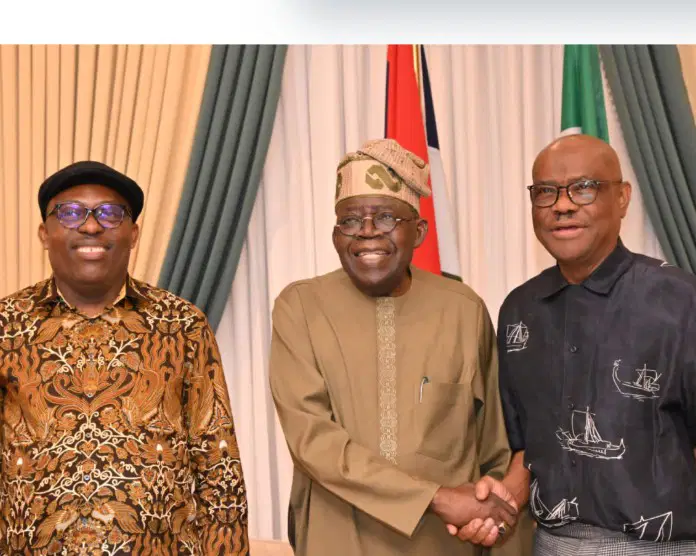Forgotten Dairies
Fubara, Even If They Pick Your Soap and Toilet Roll: You Must Return to Office -By Professor John Egbeazien Oshodi
Just returned from another European “working vacation,” while the Senate recessed, the judiciary stayed muted, and democracy burned quietly.

They tried to play god, emperor, and executioner. But illness, exile, and silence have scattered their plans.
Rivers State, once governed by shadows and puppets, now prepares for the return of its real governor.
Not because his enemies have changed, but because the people are still watching.
Three Men, One State, and the End of Pretend Democracy
They ruled one state like three heads of a beast: one played god, one played emperor, and one played pawn.
But as fate would have it, when it mattered most, one was reportedly too sick to appear, one flew out on a “working vacation,” and the last—once suspended, mocked, and seemingly forgotten—stood quietly at the edge of his own return.
This is the story of Rivers State, Nigeria, in September 2025.
A story soaked in irony, shadowed by betrayal, and burdened by a hope that refuses to die.
The Man Who Played God—And Couldn’t Govern from a Sickbed
There once was a man who confused Rivers State for his backyard.
He didn’t just lead. He owned. Or so he believed.
Nyesom Wike’s word was law. His approval crowned kings. His anger dethroned them.
He handpicked Siminalayi Fubara as a formality—not a future. He expected loyalty, not leadership. Gratitude, not growth.
He surrounded Fubara with commissioners loyal to him, not the state.
He funded judicial infrastructure not to elevate justice, but to house it under his thumb.
He controlled the House of Assembly like a private estate. Every position—from aides to houseboys—served his temple of ego.
And now?
We are told Wike is unwell, reportedly in London.
The once-roaring lion is quiet—no growls, no boasts, no presence at critical state events.
He did not attend Vice Admiral Ibas’s thanksgiving. He did not crown the very farce he once directed.
For the first time in years, Wike was not at the center. The script moved on without him.
He could build residences for judges but not restore his own health.
He could buy allegiance but not stop time.
He could not carry the state to London.
The Emperor Abroad
President Bola Tinubu, architect of the so-called emergency in Rivers, followed a familiar script.
Faced with a constitutional fire, he chose air miles over accountability.
Just returned from another European “working vacation,” while the Senate recessed, the judiciary stayed muted, and democracy burned quietly.
The Senate was in recess—again.
The Assembly? A rubber stamp, echoing commands instead of conscience.
The judiciary? Quiet as stone, its gavel frozen by fear or favor.
And the president? Missing in moral action.
Not a word of rebuke as Senator Natasha Akpoti-Uduaghan was blocked from taking her rightful seat.
Not a whisper of concern as journalists were detained without trial.
Not even a note of sorrow as young Nigerians—pushed to the edge by hunger, joblessness, and despair—took their own lives.
This is not mere governance failure.
It is the psychological abandonment of a people.
A ruling class more devoted to ribbon-cuttings than coffins.
A political order where power mimics responsibility but avoids consequence.
Where silence, once strategy, is now the loudest form of complicity.
And now—ironically—it is Wike, not Tinubu, not INEC, not the judiciary, announcing that Fubara will resume office on the 18th.
Wike, reportedly abroad and receiving medical care, speaking like a landlord confirming the return of his servant.
As if Rivers State were his ancestral compound, the people his staff, and the governor merely a houseboy awaiting instructions.
He speaks. Institutions obey—not out of duty, but decay.
The tragedy is no longer simply political.
It is emotional. Existential. National.
Nigerians are asked to salute a democracy they have never experienced.
Taught to obey laws that rarely protect.
Encouraged to hope while drowning in despair.
The Pawn Who Refused to Fall
Siminalayi Fubara did not attend the thanksgiving either.
Not out of illness—but out of dignity.
He had no place in a charade.
He did not preside over that hollow ceremony because he knew what it meant.
He knew who truly called the shots behind that “emergency rule.”
He knew the joke—and he chose not to laugh.
He did not give them the show they craved.
He waited. He watched. He endured humiliation, surveillance, suspension.
But he did not yield.
Let Wike dictate the brand of soap.
Let Tinubu suggest the toilet roll.
Let the Assembly bark threats like well-trained pets.
None of it matters.
Fubara will return to that seat.
Not because the institutions allowed it. But because time exposed the lie.
Because the people remember.
And because history rewards patience more than theatrics.
The Joke Is Over
The Rivers Assembly may still try to play god.
The courts may still slow-walk justice.
The police may still protect power over people.
But the charade is cracked.
The silence of the past now echoes with laughter.
The fear has started to fade.
Even ridicule has turned prophetic.
Let the actors in this tragic drama understand:
Power cannot cure illness.
It cannot outrun memory.
And it cannot dictate the future when the people have already seen the truth.
Fubara, the seat is yours.
Take it—not with vengeance, but with vision.
Govern like someone who knows what betrayal feels like.
And lead like someone who now understands the cost of borrowed loyalty.
Even if they pick your soap and toilet roll—
It is still your house.
Return to it. And restore it.
History is watching. And so are the people.










